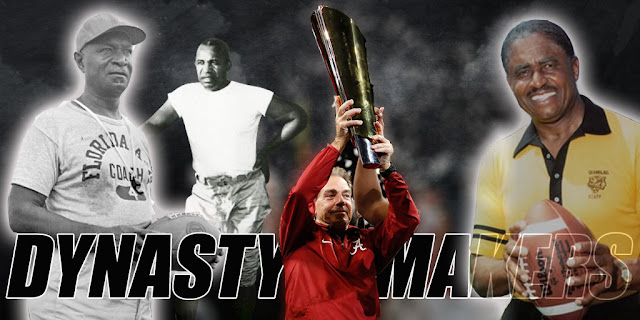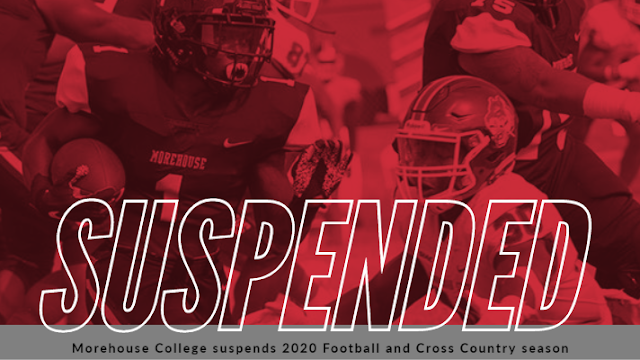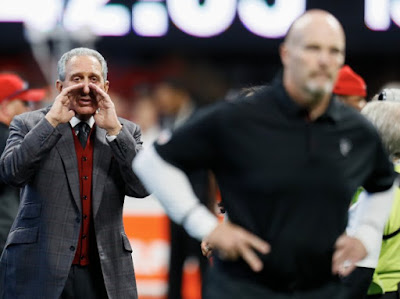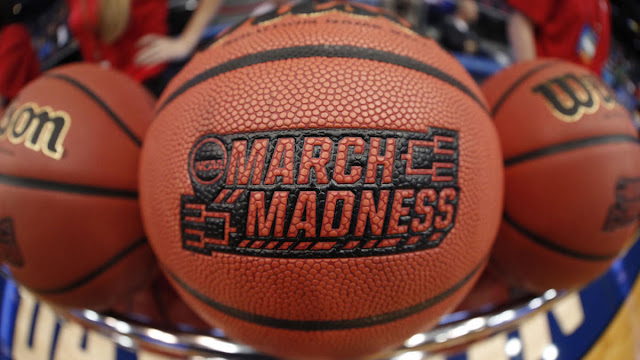Dynasty Makers: Saban Follows Path of HBCU Legends
By: Dr. Kenyatta J. Cavil and Bryan Fulford
The latter is a stretch, especially to those that still may call him the second greatest coach at Alabama, but if you consider the last 13 seasons, Saban has done something that very few have accomplished before, built a dynasty at one school so quickly into his years at the school.
In those years, he has amassed a 163-17 (.906) overall record, 94-11 (.895) record in the Southeastern Conference (SEC) with seven SEC championships, and a 13-5 postseason record. His teams have been ranked No.1 at some point during the season every year.
Saban has accomplished more than two names most mainstream media associate with being the greatest of their era, Alabama’s Paul ‘Bear’ Bryant and Ohio State’s Woody Hayes.
From 1958 to 1982 (25 years) Bryant won 232 games, lost 46 with 9 ties. It was his last coaching stop after four years at Texas A&M, eight at Kentucky and one at Maryland. His best 13 years were at the end of his career (1970 - 1982) when he had a 130-24-2 (.840) overall record leading the Tide to three of his six national championships (73, 78, 79) and nine SEC titles (eight outright) during a 75-11 (.872) record. He had one unbeaten team (1979) and a postseason bowl record of 7-5-1 winning the Sugar Bowl four times.
The Greatest Tiger
Robinson began his career during a period when Jim Crow segregation laws prevented the young African-American men he coached from playing at schools like Alabama, yet the dynasty he built produced national and conference champions, All-Americans and over 200 future professional football players on par with the success of Saban.
The best 13-year period during Robinson’s 55-year Grambling era is arguably from 1971 to 1983 when he led the Tigers to 118 wins, 29 losses with six ties (.791) while winning six of his nine Black college national championships, 10 of his 17 Southwestern Athletic Conference (SWAC) titles, four outright, while earning a 64-12-3 (.829) record in conference.
Grambling was 4-3 in postseason bowl and playoff games during this time period, which included two different trips to the NCAA semifinals of the playoffs at different levels. The 1973 team played in the NCAA D-II semifinals while the 1980 team, ranked No.2 in the country, played in the NCAA I-AA (FCS) semifinals.
The Agile, Mobile, Hostile Rattler
After five seasons at Florida A&M, coach Gaither put together a run from 1950 to 1962 that began with a Black college national championship, the first of eight during those 13 seasons, and concluded it with the AP Small College National Championship in 1962. He had a record of 110-12-3 (.892) during those years, winning the Southern Intercollegiate Athletic Conference (SIAC) 12 times (11 outright) with a 60-2 (.968) record. There were only three seasons in his 25 years that FAMC, later known as FAMU, did not win a conference championship.Gaither’s teams went undefeated three times during his period (‘57, ‘59, ‘61) and went 7-6 in the Orange Blossom Classic, the only postseason bowl game opportunity FAMU had during this period of segregation in the South. It was during this period that Gaither held annual coaching clinics in Tallahassee, FL that staffed coaches like Bryant, Hayes, and others, such as Darrell Royal, Frank Broyles, and Adolph Rupp.
The Texas Panther
This is the same year his Prairie View Panthers football team became the first Black college to play in a desegregated national championship football game. The Panthers lost to the Saint John’s Johnnies football team out of Minnesota, 33 to 27, in the NAIA Championship Game Camellia Bowl in Sacramento, California. During Nicks’ career his teams were declared the Black college football national champions six times. Nicks was inducted into the College Football Hall of Fame as a coach in 1999.
Nicks came to Texas after the 49th Legislature on June 1, 1945 changed the institution name from Prairie View State Normal & Industrial College to Prairie View University of Prairie A&M College (now Prairie View A&M University) as the head coach after holding the same title at Morris Brown College in Atlanta, Georgia. He was fresh off a two-year stretch as USO director at Fort Stewart (Ga.) and then at Tuskegee Army Air Force Base. This would be the first of two stints for coach Nicks.
During his first stint, however, Nicks only spent three seasons at the helm of the Panthers and went 15-9-3 before assuming duties as an assistant coach at Prairie View for the next four years. Ultimately, Coach Nicks led the Prairie View football program to five Black college national titles, one SIAC title, and six SWAC titles. During this period, he was recognized by his peers and often by the Black community as the counter narrative to Coach “Bear” Bryant of Alabama; indeed, his winning percentage was higher than Coach Bryant’s winning percentage.
The 13 seasons (1952 - 1964) that make up the second stint began with a run of three unbeaten conference championship seasons, a perfect 12-0 season in 1953 that ended with two bowl wins in the Orange Blossom Classic and Prairie View Classic, and a second Black college national championship during a 10-1 season in 1954. He also had one of the most notable coaching stretches against the greatest collection of coaches regardless of ethnic designation from 1958 to 1961 (See details below). The 1963-64 seasons were significant for the NAIA championship game as previously mentioned, a 19-1 overall record, 14-0 conference record and back-to-back Black college national championships. Nicks led Prairie View to a 106-24-4 record (.806) and 69-14-1 (.827) in conference with a 9-3 (.750) postseason bowl record.
Eventually, Bryant and Hayes would see the future of the sport through programs built by men like Robinson, Gaither and Nicks who had less resources than them, but accomplished just as much on their own roads into induction to the college football hall of fame. Now the modern era of players and teams that Saban recruits and builds are stocked with the best, many of them young African-American men that had limited school options 75-50 years ago.
As college football and sports historians move into this new millennium where all future coaches are compared to Nick Saban, it goes without saying that his success should be viewed in comparison to predecessors that never were afforded the resources and freedoms Bryant, Hayes and later Saban enjoy. Their accomplishments are no less grander or eye-catching given the challenges that came with being an African-American football coach. We'll never get to compare head-to-head or era because of the various changes of the sport through the decades. But, we have the numbers and the championships that can should never be disputed.
More HBCU Dynasty Makers
Cleveland Abbott (Tuskegee institute 1924 - 1933) might have had the FIRST college football dynasty. Hired by Booker T. Washington ten years before he became the head coach and athletic director in 1923, Abbott won four consecutive black college national championships and six in seven years from 1924-1930. Tuskegee lost one game during those seven years, and had two seasons where they were unbeaten with no ties. He led Tuskegee to 10 consecutive SIAC championships from 1924 - 1933, and an 11th in 1935. During that 13 year run Abbott’s record was 109-19-18 (.808) with a 4-1 bowl/playoff record in the Prairie View Bowl against Prairie View College (later known as Prairie View A&M University). Abbott coached 32 seasons at Tuskegee with an overall record of 206-99-27 (.661).
Edward P. Hurt (Morgan State 1930 - 1949) should be considered the first coach to have a dynasty that spanned two decades, and it’s debatable as to which decade was more impressive. During the 1930’s, Hurt led the Morgan Bears to two black college national championships and six Central Intercollegiate Athletic Association (CIAA) championships. The Bears had a 54-game unbeaten streak from 1931 to ‘38, and three teams went unbeaten with no ties (‘33, ‘35, ‘37). Hurt was 63-7-9 (.854) with just eight of those games played outside of the conference schedule (Morgan was 8-0-1) during this period.
The second decade (1940s) was equally as impressive as the previous. Known as Morgan State beginning in 1939, Hurt led the Bears to four black college national championships and seven CIAA championships with a 61-9-4 (.851) record that includes a 9-0-1 non-conference record. The 1943 team did not allow a single point to their opponents over five games during a season where many schools had seasons cancelled or shortened due to World War II. That team, along with the 1946 and ‘49 teams went unbeaten with no ties.
That 20-year period produced 124 wins, .853 win percentage, 13 conference championships and six black college national championships. Hurt coached 31 seasons at Morgan State with a record of 173-51-20 (.750) and not solely as the football coach. He coached basketball (1929-47) and track (1929-70) where he also won conference and national championships.
Arnett William “Ace” Mumford (Southern University 1948-1960) found his greatest period of success in his 12th season at Southern where he would lead the Jaguars to a perfect 12-0 season and black college national championship. It was his first at Southern and second overall having previously won with Texas College in 1935, his last year before departing for Southern. Beginning with that season, Southern won 3 consecutive national championships and had a 38-game unbeaten streak from 1948 to ‘51.
In total, Mumford led the Jaguars to five black college national championships during this period, and won six SWAC championships (four outright), finishing second in the other seven years with a 108-25-4 (.803) record. Mumford only coached Southern in one postseason bowl game, the historic 1948 Fruit Bowl in San Francisco. It was the first interracial college football game. Southern beat San Francisco State 30-0. Overall, Mumford coached 26 seasons at Southern with an overall record of 179-61-33 (.716) and 233-85-23 (.717) career coaching record.
Merritt’s Tennessee A&I/State were not in a conference during his years and those teams never had a losing season. In these 13 seasons, TSU was 112-20-3 (.841) with a 4-2 bowl/postseason record. Overall, Merritt had a 172-33-7 (.828) career record at Tennessee State with a combined record of 235-70-12 (.760) for his 32 years of coaching at two blue-blood HBCU programs.
Pete Richardson (Southern 1993-2004) brought back the football dominance in the SWAC and black college football that Southern University enjoyed in the SWAC with “Ace” Mumford back in the late 40’s and 50’s. Richardson made an immediate impact in the conference and the program by leading the Jaguars to the first of three black college national championships over 5 seasons and posting 11-win seasons with one regular season loss every other year from 1993 - 1999. Southern closed the decade with three unbeaten conference championship seasons, which included winning the inaugural conference championship game in 1999. After a few years just above .500 at the turn of the century, Richardson won his fourth black college national championship, second undisputed, and fifth conference championship in 2003.
Over these 12 years, Southern was 105-38 (.734), and 69-14 (.831) with four unbeaten seasons in the SWAC. Along with winning the inaugural SWAC Championship game, Richardson’s Jaguars were regular postseason bowl participants in the Heritage Bowl, which matched the SWAC conference champion against one of the Mid-Eastern Athletic Conference’s (MEAC) top teams. Richardson’s teams went 4-2 in the Heritage Bowl during his first seven seasons and participated in the game five consecutive years. It’s hard to argue that Southern was not the team of the 90’s under Richardson, who coached 17 seasons at Southern with a record of 128-62 (.674) and career record of 169-76-1 (.689) with five highly successful seasons at Winston Salem State University.
Henry Kean (Kentucky State 1931-1942, Tennessee A&I 1944-1954) had two dynasties at two different schools which were notably separated by WWII in 1943. In 12 seasons with the Kentucky State Thorobreds, Kean won two black college national championships and six conference championships in the Midwest Athletic Association (MAA). They twice finished with a perfect season (1934 and 1937) and he led KSU to the Orange Blossom Classic twice where they won once and lost another. His overall record was 72-18-6 (.781).
In 1944 Kean resurfaced at another MAA school, Tennessee A&I (later known as Tennessee State) and proceeded to win four black college national championships and five conference championships with two perfect seasons, 1947 and 1954, his last year coaching football. He won three consecutive Vulcan Bowls his first three seasons with the Tigers. His record at Tennessee A&I was 95-13-3 (.851). The combined 23 years led to an overall record of 165-33-9 (.819), six black college national championships, 11 conference championships and four perfect seasons.
In just his third season at Central State, Joe led the Marauders to the NCAA D-II National Championship game where they would lose their only game of the season. But, that season kicked off a run of 10 more playoff appearances on the NCAA D-II level and later the NAIA Division-I level that Central State moved to in 1987. From 1990 to 1992, Joe led Central State won two NAIA Division I National Championships (‘90 and ‘92) and a National Runner-Up in ‘91. Central State won five consecutive black college national championships from 1986 to 1990 and a sixth in 1992. In three of these seasons (‘86, ‘88 and ‘89), CSU was the undisputed black college champion. Joe tallied a 120-30-4 (.792) record with a 3-4 NCAA D-II postseason record and 11-4 NAIA postseason record.
In 1994, Joe took over the head coaching position at Florida A&M University (FAMU) and looked to bring the Rattlers back to a championship level that FAMU experienced when they won the first NCAA I-AA National championship in 1978. Under Joe, FAMU made the first of six consecutive I-AA playoff appearances in 1996. They would host and win their first playoff game since their ‘78 championship season in 1998. He led the Rattlers to the semifinals in 1999, narrowly losing late in the fourth quarter. Joe won two black college national championships (‘98 and ‘01) and five MEAC championships with FAMU. He had a career record of 86-46 (.652) over his 11 seasons with a 56-17 (.767) conference record. Joe held a 3-6 record in the playoffs.
Billy Nicks vs. The Legends
– SWAC from 1958–1961 –
PVAMU vs Jackson State - Coach “Big” John Merritt
(2-1-1)
7 - Black college national (1965–1966, 1970–1971, 1973, 1979, 1982)
5 - Midwestern Athletic Association/Midwestern/Midwest Conference (1957, 1963–1966)
2 - SWAC (1961–1962)
PVAMU vs Southern - Coach A.W. “Ace” Mumford
(2-2-0)
6 - Black college national (1935, 1948–1950, 1954, 1960)
13 - SWAC (1934–1935, 1937–1938, 1940, 1946–1950, 1955, 1959–1960)
PVAMU vs Grambling State - Coach Eddie Robinson
(2-2-0)
9 - Black college national (1955, 1967, 1972, 1974–1975, 1977, 1980, 1983, 1992)
1 - Midwestern Athletic Association/Midwestern/Midwest Conference (1955)
17 - SWAC (1960, 1965–1968, 1971–1974, 1977–1980, 1983, 1985, 1989, 1994)
PVAMU vs Texas Southern - Coach Alexander Durley
(3-1-0)
1 - Black college national (1952)
1 - Midwestern Athletic Association/Midwestern/Midwest Conference (1952)
2 - SWAC (1944, 1956)
PVAMU vs Wiley College - Coach Fred “Pop” Long
(4-0-0)
3 - Black college national (1928, 1932, 1945)
10 - SWAC (1923, 1927–1930, 1932, 1944–1945, 1956–1957)
-Total- 1958–1961
SWAC 13-6-1 / Overall SWAC 20-6-0
PVAMU vs Florida A&M - Coach Jake Gaither
(1-1-0); Orange Blossom Classic; Overall (2-1-0)
1 - AP Small College National (1962)
8 - Black college national (1950, 1952–1954, 1957, 1959, 1961–1962)
20 - SIAC (1945–1950, 1952–1965)
3 - SIAC Division A (1967–1969)
-Total- 1958–1961
All Coaches Listed 14-7-1 / Overall 30-7-2
1 - National Black College Champions
2 - SWAC Champions
About the authors:
Jafus Kenyatta Cavil currently serves as the Interim Associate Dean of Academic Affairs in the College of Education at Texas Southern University. He is a professor (sport management/sport studies/sports entertainment) in the Department of Health, Kinesiology and Sport Studies with a joint appointment in the School of Communication. Cavil specializes in sport business leadership and entertainment and is one of the preeminent scholars on critical sports studies and has an area of research interest in the sporting HBCU diaspora, HBCU sports culture theory, and HBCU athletics aesthetics.
He has published research articles such as The State of Intercollegiate Athletics at Historically Black Colleges/Universities (HBCUs): Past, Present, & Persistence, completed commission studies such as, HBCU (A Minimum of Nine, A Maximum of 12) Football Reclassification & New HBCU FBS Conference Formation Study, and a book chapter titled: The Case for Tennessee State as an expansion member of the SWAC: Economic Impact. Cavil is the co-editor of the textbook titled, The Athletic Experience at Historically Black Colleges and Universities – Past, Present, and Persistence with Billy Hawkins, Joseph Cooper, and Akilah Carter-Francique.
Dr. Cavil’s Inside the #HBCU Sports Lab with Mike Washington and Charles Bishop radio show airs live every Tuesday at 6pm CST on KCOH 1230AM, BCSN/Jericho Network, Facebook Live, and YouTube. Kenyatta is married to Faith Washington-Cavil and they have a son, Deuce.
Bryan Fulford currently serves as the Vice President of the Black College Sports Network and co-host of the "BCSN SportsWrap" podcast, which is available everywhere you can download podcasts, including Spotify, Anchor, Google and Apple Podcasts, iHeart Radio Podcasts, and YouTube.
In addition to those duties, he manages the BCSN social media accounts on Twitter and Instagram (@MyBCSN1), does graphic design, writing and editing, as well as play-by-play and color commentating for various sporting events broadcast on the network.
Bryan is a graduate of Florida A&M University's School of Business and Industry. He also has coached youth and high school basketball in the Central Florida/Orlando, FL community for nearly 20 years.

















Comments
Post a Comment